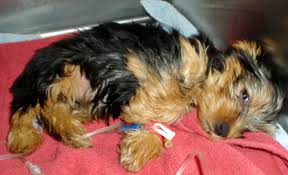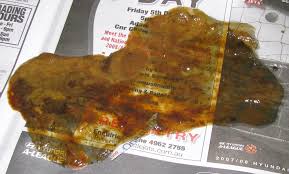Given that we are currently treating 2 dogs who have parvovirus, we thought it was an important time to share some information on this devastating illness so that you have a better understanding of why it is so important to vaccination your dogs.
What is canine parvovirus (parvo)?
Canine parvovirus, more commonly known as parvo, is a highly contagious viral disease causing severe illness that can pose a fatal risk to your dog. There are two forms of canine parvovirus; one attacks the gastrointestinal tract and the other attacks the cardiovascular system. By far the most commonly seen type is the gastrointestinal tract form. Once the virus is in the gastrointestinal tract, the cells rapidly divide causing damage to the lining of the intestines and even affecting the bone marrow within the tract. Because white blood cells are damaged and or destroyed in this process, your dog is then vulnerable to a broad spectrum of infections. In the photo below, it is easy to see how sick this puppy is from this terrible disease.

How does my dog catch canine parvovirus?
Although puppies under six months of age are most at risk with the disease, dogs of all ages are susceptible if there are no prevention measures in place. The main source of virus transmission is when your dog ingests or comes into contact with contaminated faeces from in infected dog. This can be from footpaths, parks, shoes and coming into contact with infected dogs. While you may be thinking “I didn’t see any poo or come in contact with any other dogs”, it is important to know that the virus can remain actively infectious in the environment for up to eight months. The virus can also be transmitted by people coming into contact with an infected dog and then touching your dog without correctly washing their hands and or clothing. Therefore if there has been parvovirus within your environment, precautions must be taken when bringing or sending animals from the premises.
What are the symptoms?
Dogs who become infected with canine parvovirus can sometimes take four to fourteen days from the initial exposure to become ill or show any symptoms. Common clinical symptoms include:
- loss of appetite
- fever
- depression
- lethargy
- profuse bloody/watery diarrhoea and or vomiting.
Dehydration is then also an issue as your dog is expelling a lot more fluid than they are taking in. The photo below is very typical of what typical parvo diarrhoea looks like.

How is parvovirus diagnosed and treated?
If you think your dog may have canine parvovirus it is important to seek veterinary advice as soon as possible. Once in the consultation room a quick and painless faecal or rectal swab will be taken and tested to determine whether your dog has the virus. If a positive reading is returned, treatment can be started immediately. This involves intravenous fluids for rehydration, medication to reduce vomiting, anitbiotics to treat any bacterial infections that may arise, pain relief if the animal is in pain and anti-inflammatories to help reduce symptoms. The patient is kept in isolation and there are strict protocols for entering and exiting the isolation room to rule out the spread of the virus to other patients within the clinic. Treatment has the best outcome if the dog or puppy is brought in as soon as they show clinical symptoms.
How to prevent against canine parvovirus?
The best way to prevent the virus is to vaccinate. Vaccinations start when puppies are between six to eight weeks of age, followed by a booster at twelve weeks of age, after which a yearly booster is then required. Until your puppy is fully vaccinated you can prevent them contracting the virus by keeping them away from other dogs and other sources of infections such as parks as well as making sure you don’t come into contact with an unvaccinated or infected dog.
Please feel free to ask any staff member at the surgery to provide information and advice on vaccination for your pets!

